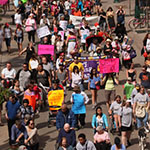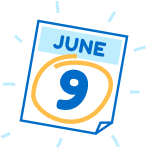EXCLUDED FROM THE MARGINALIZED
When you talk about marginalized populations, why aren’t we part of the conversation? Is it because you don’t recognize us? Is it because we aren’t always willing to use the “D” word? Disability. I don’t understand why it has to be a bad word.
I am a 35-year-old disabled woman. So, why don’t you bring me up when you talk about marginalized groups? Statistics Canada says one in five people are disabled. But when you talk about innovation, change, diversity, and aid, disability doesn’t come up. Not really. There are women’s rights, LBGTQ+ rights, indigenous rights, and newcomer rights. All of these rights have been earned by ongoing hard work and are well deserved. But where is our place on your platform? You sell disability in your diversity workbooks, but we’re not invited to the table. And if we do get a seat at the table, it’s only for the photo op.
To regulate my seizures, I have a medical implant that sends electricity up my vagus nerve every 5 minutes. It makes me sound like a robot that’s been smoking for 50 years. I’ve used accessibility services; all of them. I had seizures in university almost every single day. I didn’t talk about it. I presented to my peers and professors knowing that at any moment I might turn into a zombie. But I still did it. And I do it every single day I leave my house. I have seizures in the most intimate moments of my life. I think, “How dare you come in here. How dare you zap my brain and make me a stupefied shell.”

I don’t want to be frustrated, but I am. And I’m sad. I try to share our community with you, so I wave hello and welcome you into our circles. Is it working? It doesn’t feel like it. I continue to hear smart and powerful people speak of change opportunities and talk about the need to hear marginalized groups. But the disabled community doesn’t get a note, and so your words about diversity mean nothing.
You’re checking off boxes and you forgot about us. I was once told that disabled people are at the bottom of the triangle of Canadian rights. So, we held a celebration and invited the entire world to meet all of these beautiful disabled people and the fabulous communities that support them.

I don’t ask for sympathy. Never ever. Just know that if you don’t see us, we still see each other.
To my comrades in the disability community: We need to know each other. Let’s inspire each other, so we can continue to build our community up. I want to share your stories and be your interconnector. Together we have collective power, so please introduce yourself.
Loud and proud: Disability Pride.
In solidarity,
Andrea van Vugt, President
Disability Pride Alberta Foundation




Andrea I couldn’t agree more. I am currently looking for ladies to participate in the development of a calendar to celebrate women with physical disabilities. Please let me know if you or anyone you know us interested.
Hey, Mirella. Just curious, do the disabilities have to be physical?